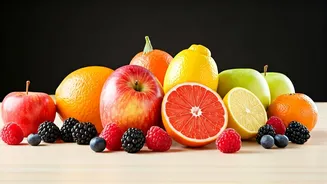Introduction: Sweet Treat
Managing diabetes doesn't necessarily mean sacrificing all your favorite sweets. Many delicious fruits are actually beneficial for individuals with diabetes,
offering essential nutrients, vitamins, and fiber. Selecting fruits wisely can provide sweetness while keeping blood sugar levels stable. The key is understanding the glycemic index (GI) and glycemic load (GL) of various fruits, and portion control. Focusing on whole, unprocessed foods and consuming these fruits in moderation can create a healthy and enjoyable dietary approach. This guide will explore ten sweet fruits that are surprisingly good for diabetes, providing practical tips on how to include them in your diet to support overall health.
Berries: Nutrient Powerhouses
Berries, including strawberries, blueberries, raspberries, and blackberries, are excellent choices for people with diabetes. They are packed with antioxidants, vitamins, and fiber, and generally have a low GI. Fiber helps slow down the absorption of sugar, which aids in preventing spikes in blood sugar. Blueberries, for instance, are rich in anthocyanins, which may improve insulin sensitivity and glucose metabolism. A cup of mixed berries can be a fulfilling snack or addition to breakfast. These berries offer many health benefits beyond their low glycemic impact. Incorporating berries into your diet can boost your intake of vital nutrients, promoting better health outcomes for those managing diabetes.
Cherries: Sweet & Beneficial
Cherries, especially the tart varieties, offer a delicious balance of sweetness and health benefits, making them a favorable option for those with diabetes. They have a lower GI compared to many other fruits. Cherries are rich in antioxidants, notably anthocyanins, which help reduce inflammation and might improve insulin resistance. Consuming cherries can contribute to lower blood sugar levels and improved heart health. Fresh or frozen cherries can be incorporated into your diet, offering a satisfying and healthy treat. Keep in mind that portion control is always important; a small serving can provide a sweet taste without overly affecting blood sugar levels.
Apples: Fiber-Rich Delight
Apples are a classic, readily available fruit that can be enjoyed in moderation by individuals with diabetes. Their high fiber content, especially soluble fiber, helps slow down the absorption of sugar into the bloodstream. Apples also contain a variety of vitamins and minerals and are generally ranked as having a moderate GI. Choose apples with the skin on, as the skin contains more fiber. A medium-sized apple can be a satisfying snack, and is often a good substitute for sugary treats. When consuming apples, monitor how your body responds and factor them into your daily carbohydrate intake for better blood sugar control. They are versatile and can be eaten in many forms, from fresh to baked, which allows for several options.
Pears: Similar Benefits
Pears share many benefits with apples, making them a suitable fruit option for people with diabetes. Similar to apples, pears are high in fiber, aiding in the regulation of blood sugar levels. Pears are also a good source of vitamins C and K, as well as potassium, supporting overall health. Opt for pears that are ripe but still firm, and eat them with the skin on to maximize fiber intake. Pears can make a delightful snack or be added to salads. Pay attention to the portion size, as with any fruit, to avoid exceeding your daily carbohydrate targets. Incorporating pears into your diet provides a natural source of sweetness and crucial nutrients.
Peaches: Moderate Choice
Peaches can be enjoyed in moderation by people with diabetes, due to their moderate GI. They provide vitamins A and C, and contain fiber that can help manage blood sugar. Peaches are sweet and satisfying, but it's important to monitor portion sizes to control carbohydrate intake. A small to medium-sized peach can be a healthy snack or addition to a meal. They can be consumed fresh, or added to salads and smoothies, offering a delicious way to enjoy sweetness with some health benefits. Paying attention to how your body reacts to peaches and incorporating them into a balanced meal plan can make them a safe and enjoyable part of your diabetes-friendly diet.
Oranges: Vitamin Boost
Oranges provide a refreshing and nutritious option for people with diabetes. They have a moderate GI and contain high levels of vitamin C. The fiber in oranges also helps to slow down sugar absorption. Consuming oranges can contribute to improved immunity and overall health. A medium orange is a good serving, as are segments in salads or as a snack. Oranges provide natural sweetness, but it's important to balance them with the other foods in your diet to manage blood sugar. By incorporating oranges in moderation, you can enjoy their benefits and add variety to your diet.
Grapefruit: Low GI Option
Grapefruit can be a useful choice for people with diabetes, as it typically has a lower GI. It's a good source of fiber, vitamin C, and other nutrients, all of which contribute to better health and blood sugar management. Some studies show that grapefruit might help improve insulin sensitivity and blood sugar control. Grapefruit can be a refreshing addition to breakfast or a snack, although it can interact with certain medications. Always discuss with your healthcare provider if you are on medications. Consume grapefruit in moderation, mindful of its tartness and how it affects your blood sugar levels. Choosing grapefruit can be a step towards better dietary habits for individuals with diabetes.
Kiwi: Unique Benefits
Kiwis are a unique and healthful fruit that can be a good choice for those with diabetes. They have a moderate GI and offer a substantial amount of fiber and essential vitamins. Kiwis have been linked to improved blood sugar control and heart health in studies. The fiber in kiwi assists in slowing sugar absorption, which is advantageous for managing blood sugar levels. Kiwis are a good source of vitamin C and other essential nutrients, aiding in overall well-being. Consuming them in moderation as part of a balanced diet provides natural sweetness without dramatically affecting blood glucose levels. Kiwis provide a flavorful and nutrient-dense way to enjoy a sweet treat.
Plums: Sweet and Simple
Plums provide a sweet and satisfying fruit option that can be integrated into a diet for people with diabetes, when eaten in moderation. They contain fiber, which helps manage blood sugar levels. Plums also offer vitamins and antioxidants, supporting overall health. The relatively moderate GI means they can be consumed without causing large spikes in blood glucose levels. Consuming plums, fresh or dried (in moderation), provides a balanced approach to satisfy a sweet tooth, but it's crucial to regulate portion sizes to remain within your daily carbohydrate targets. Plums present an enjoyable way to include fruit into your diet, assisting with overall well-being.












